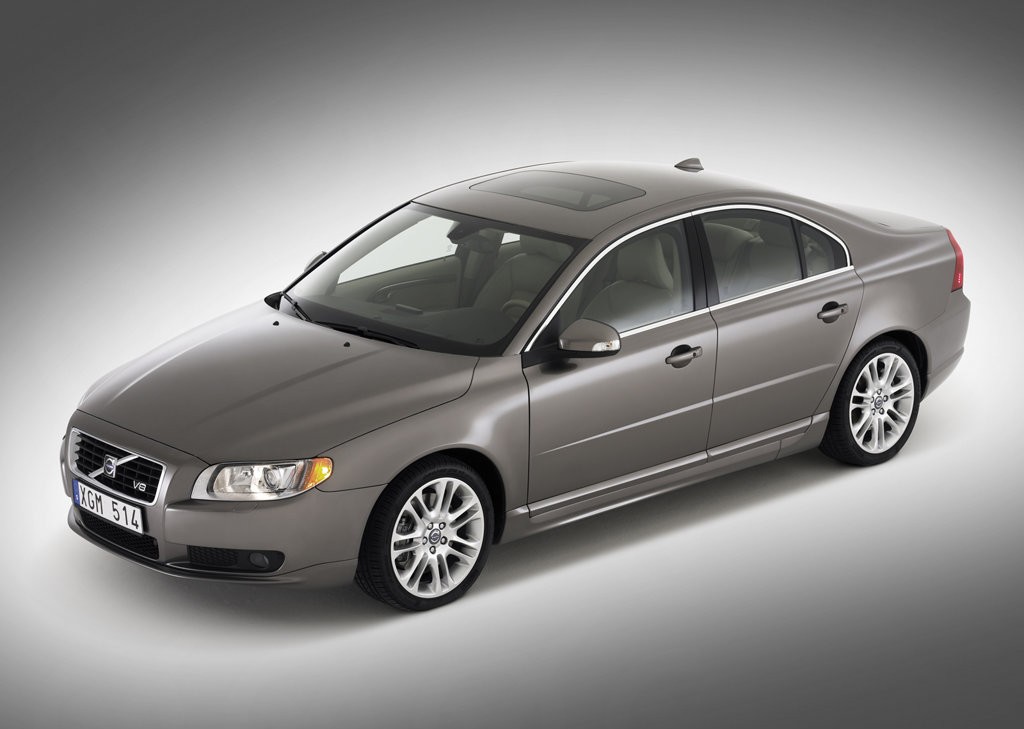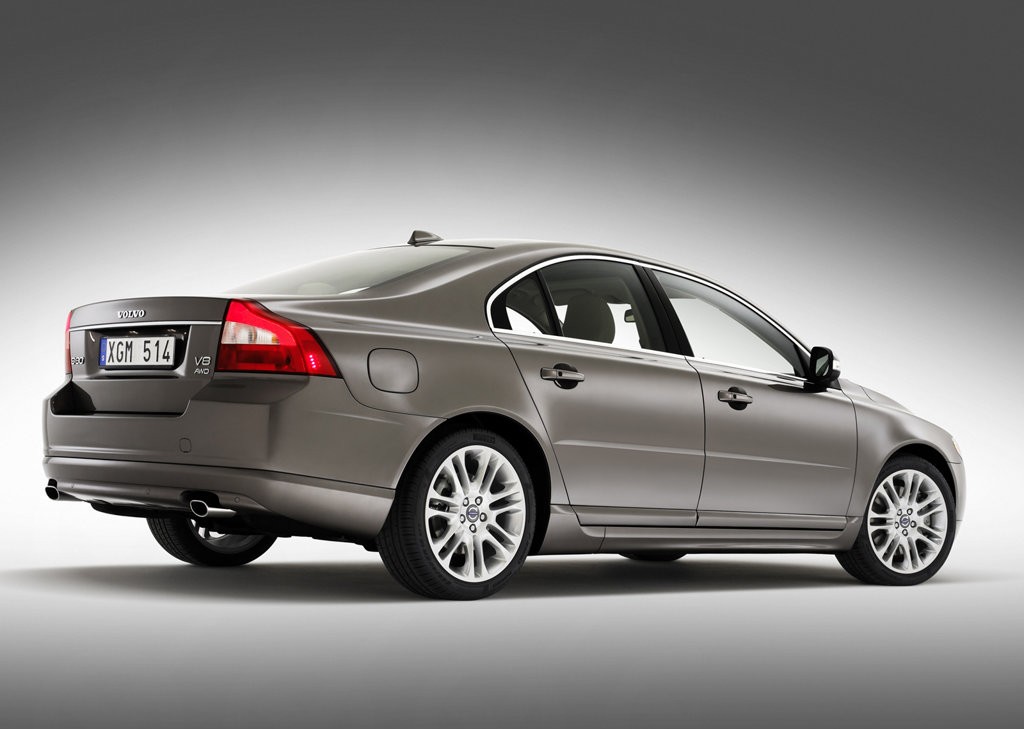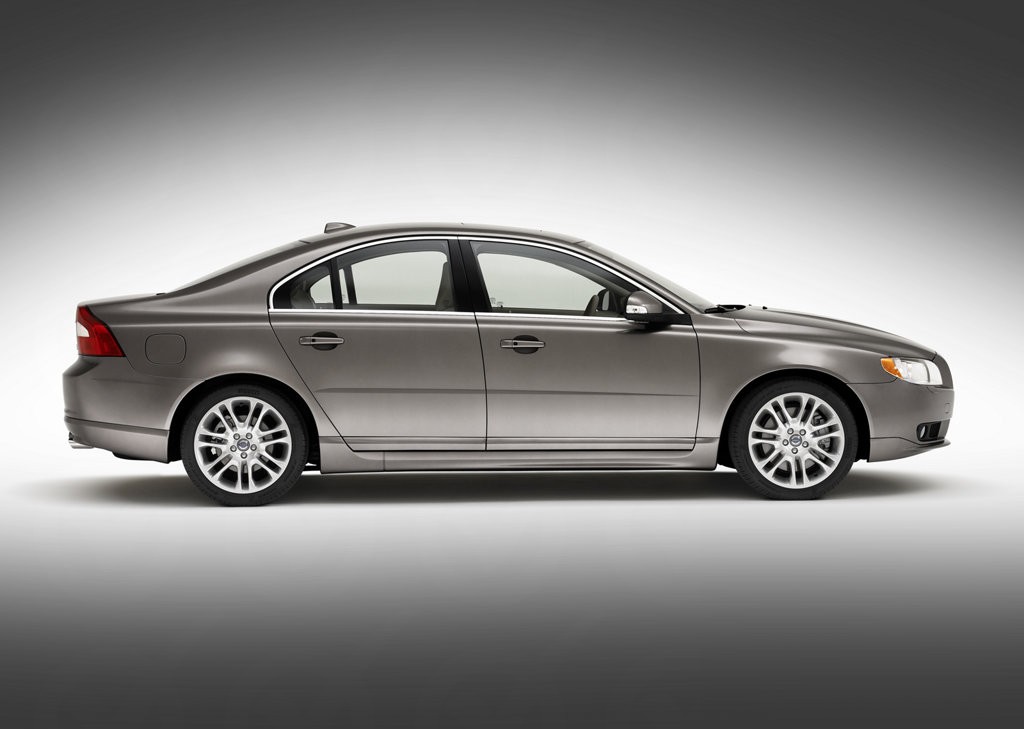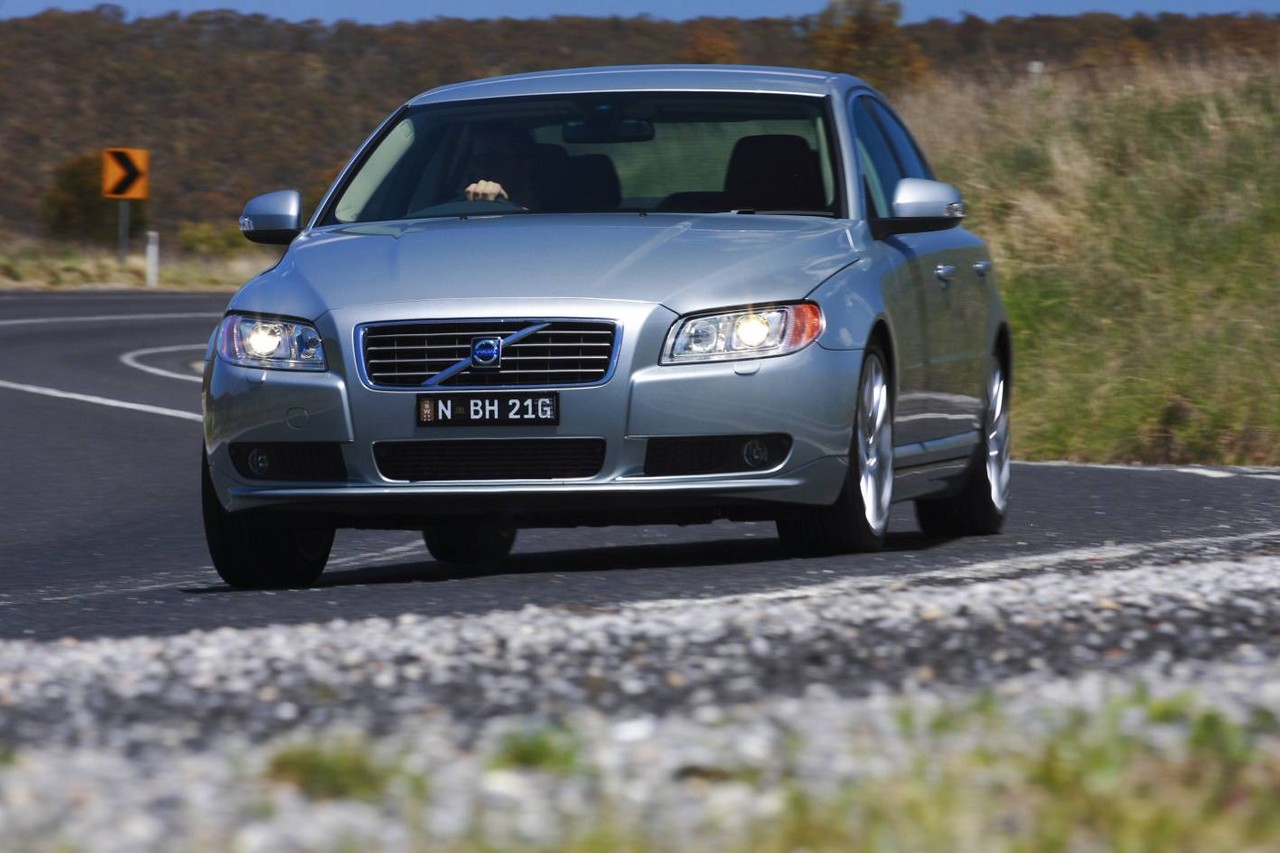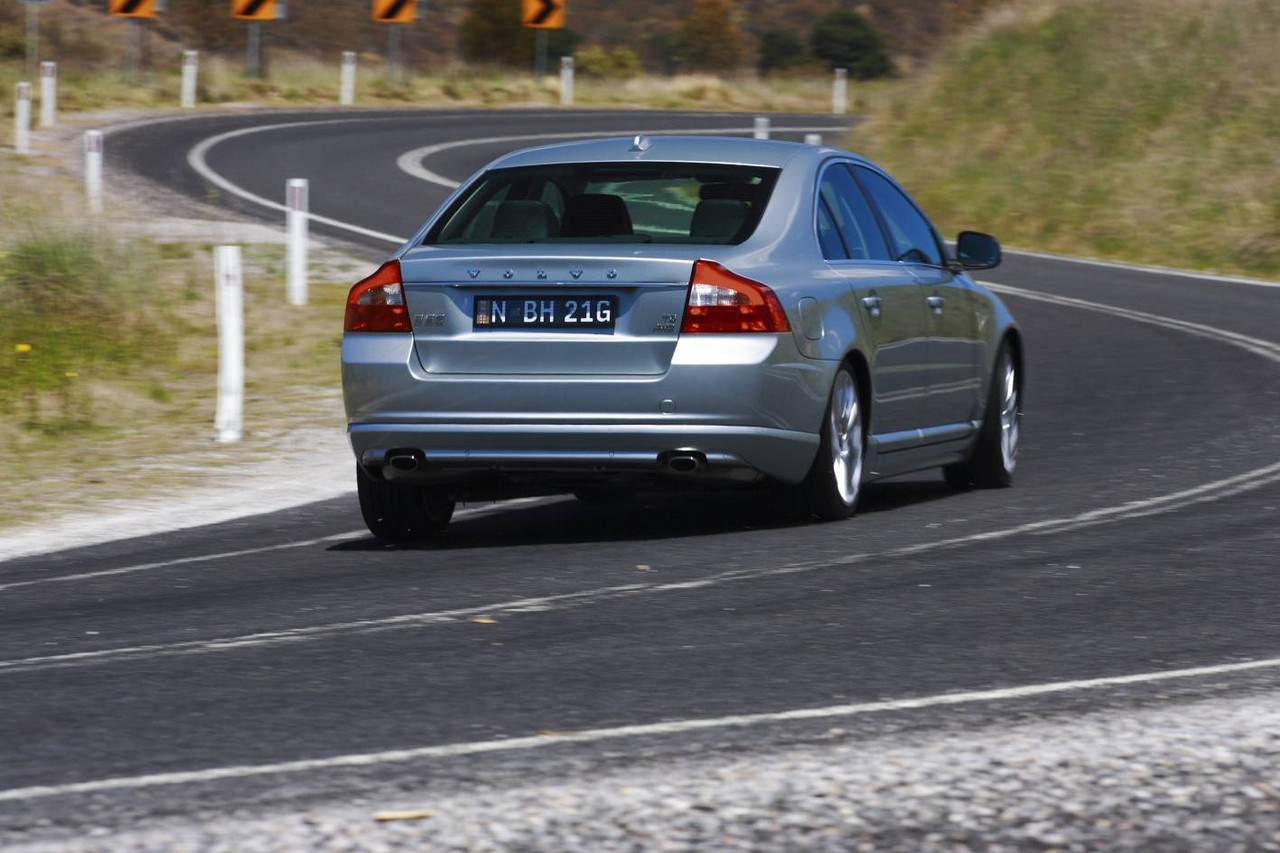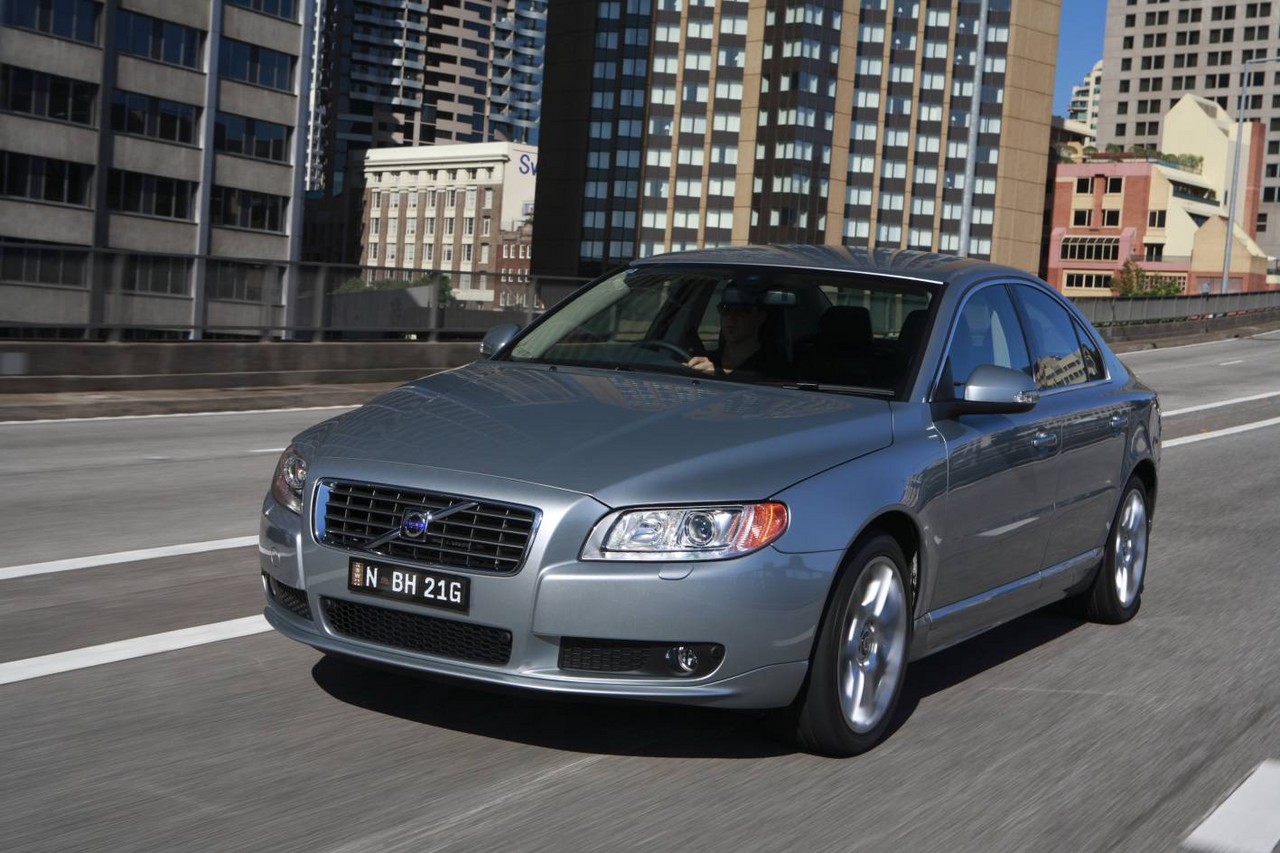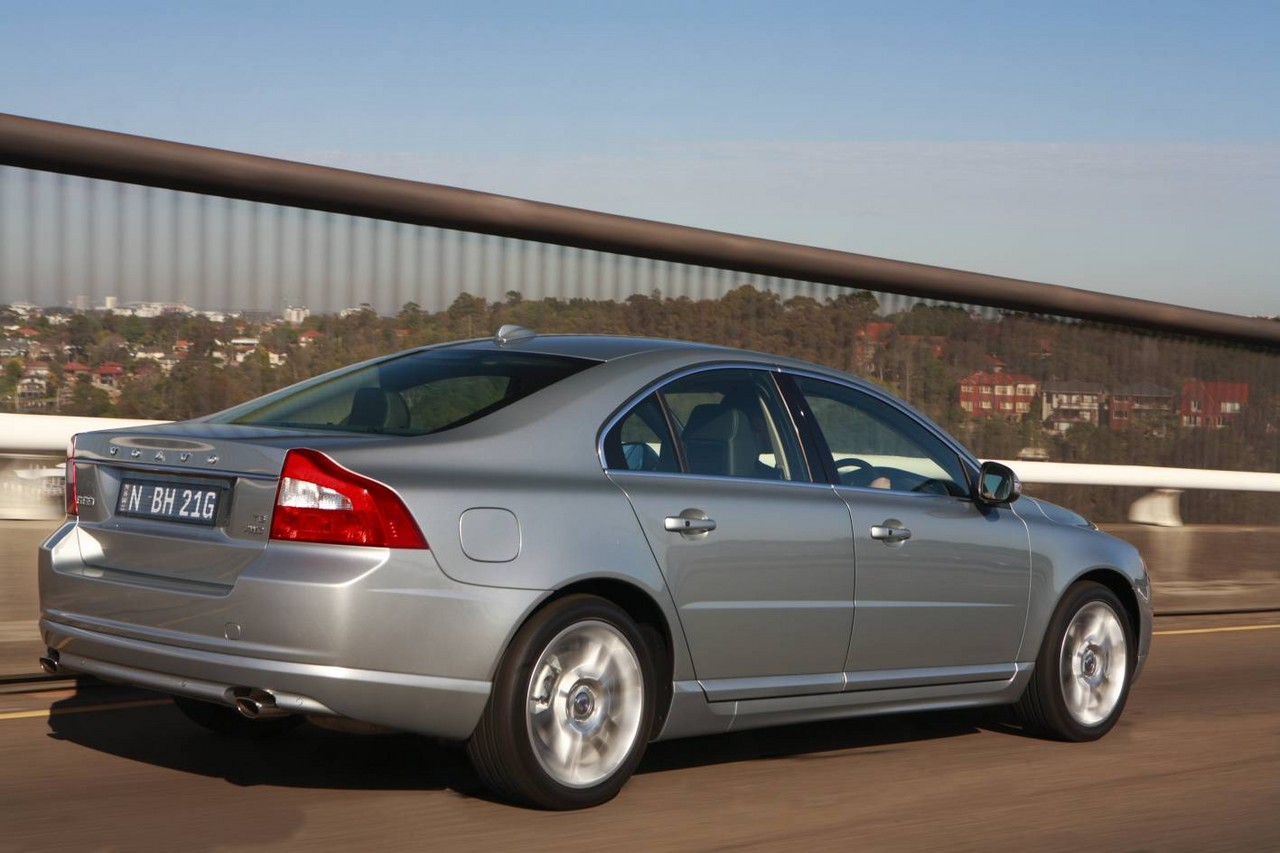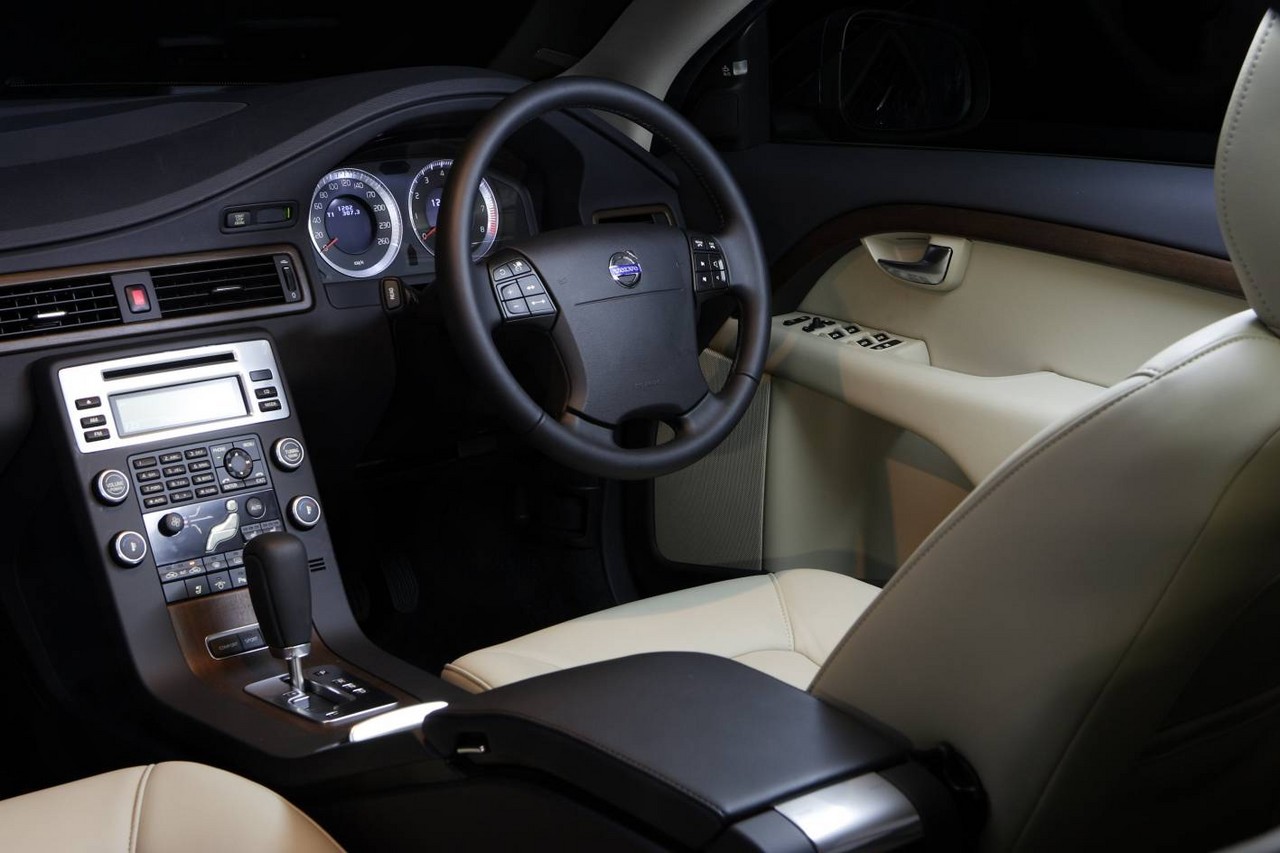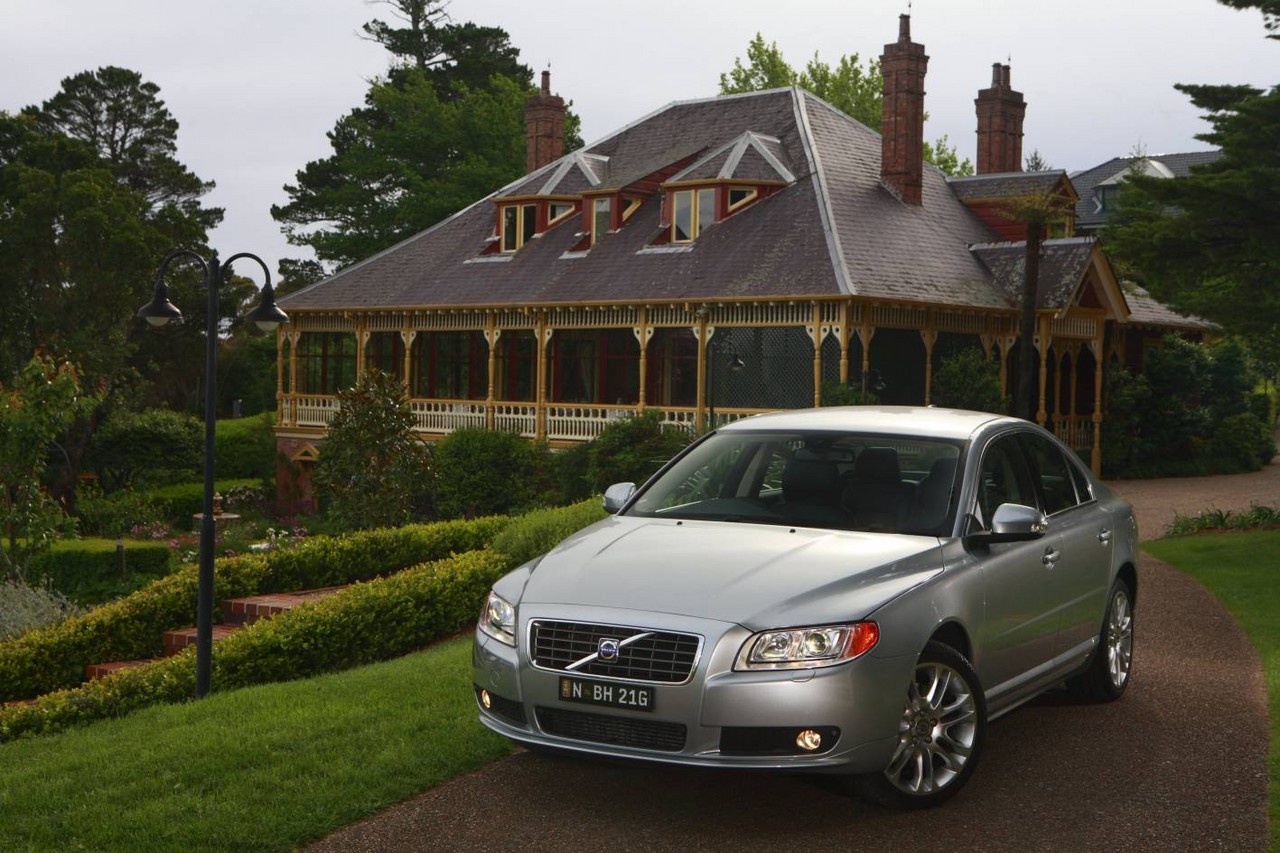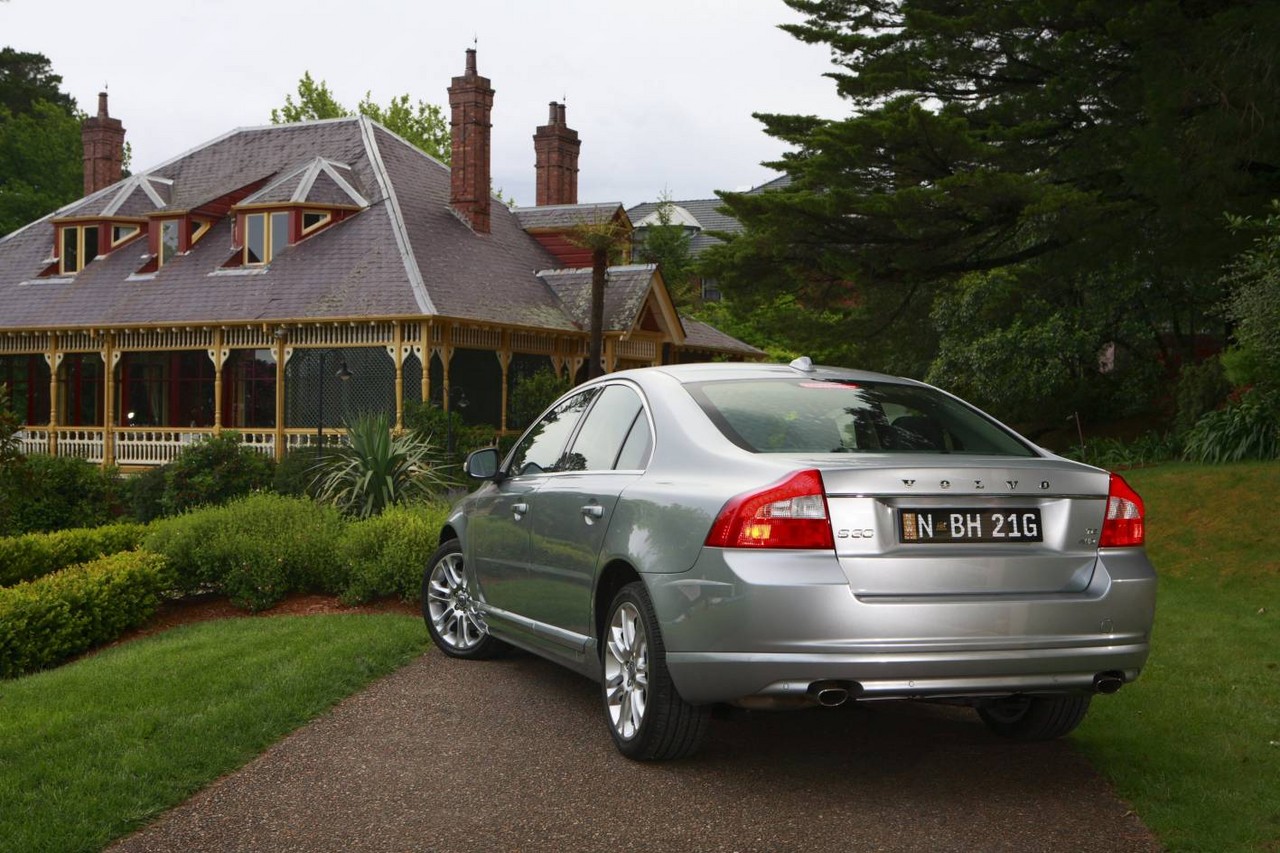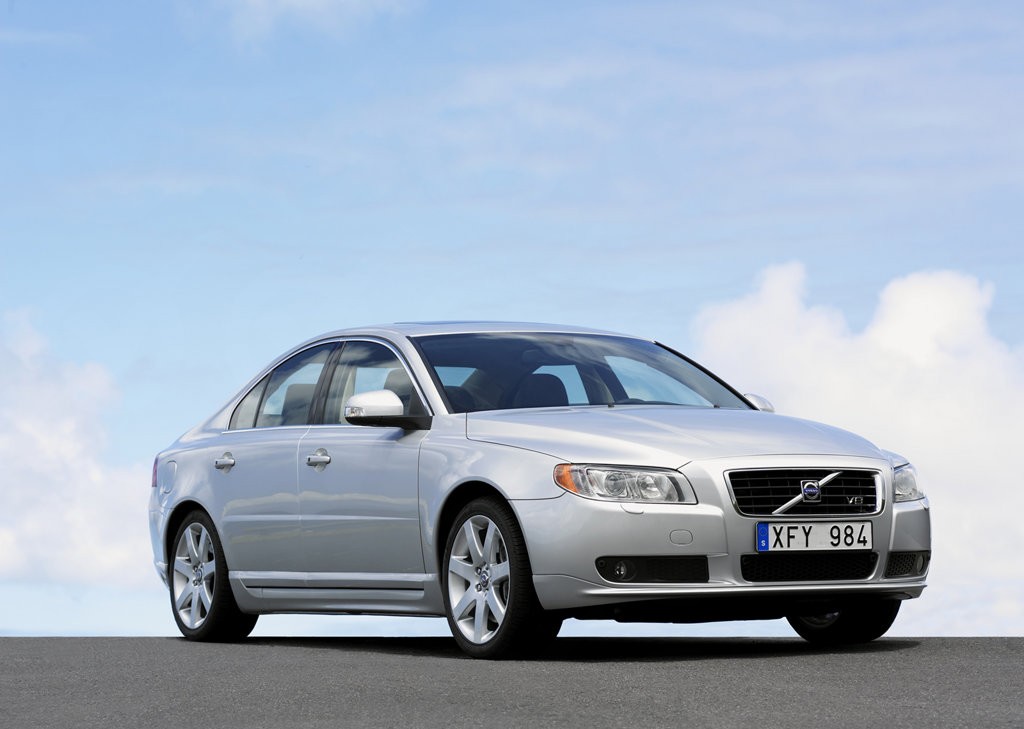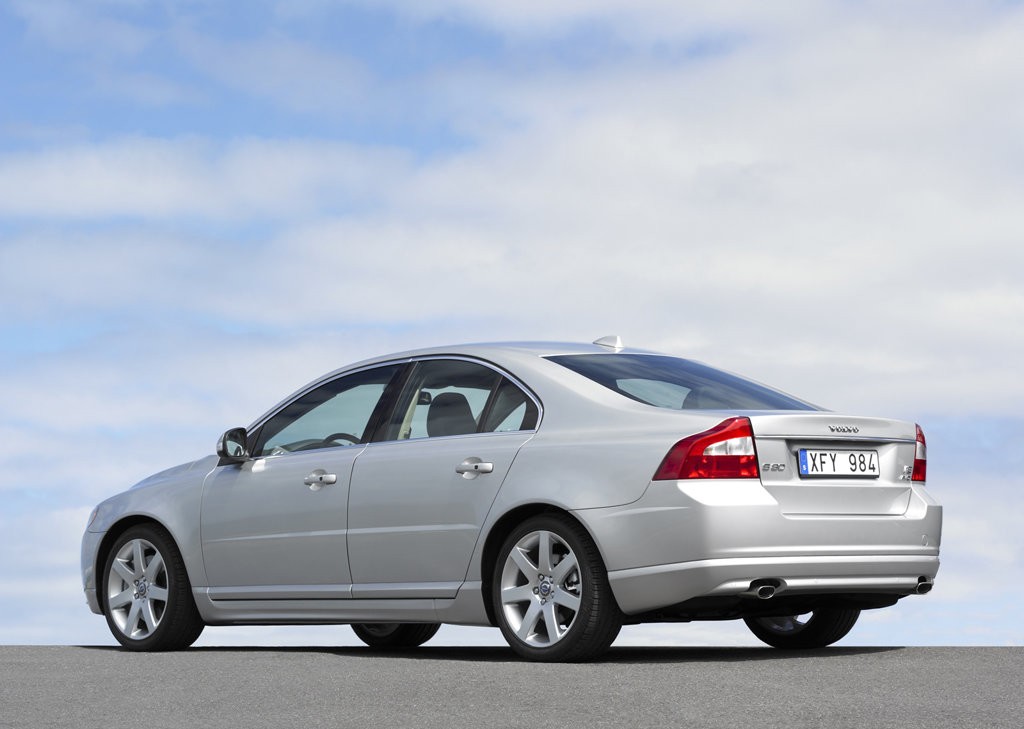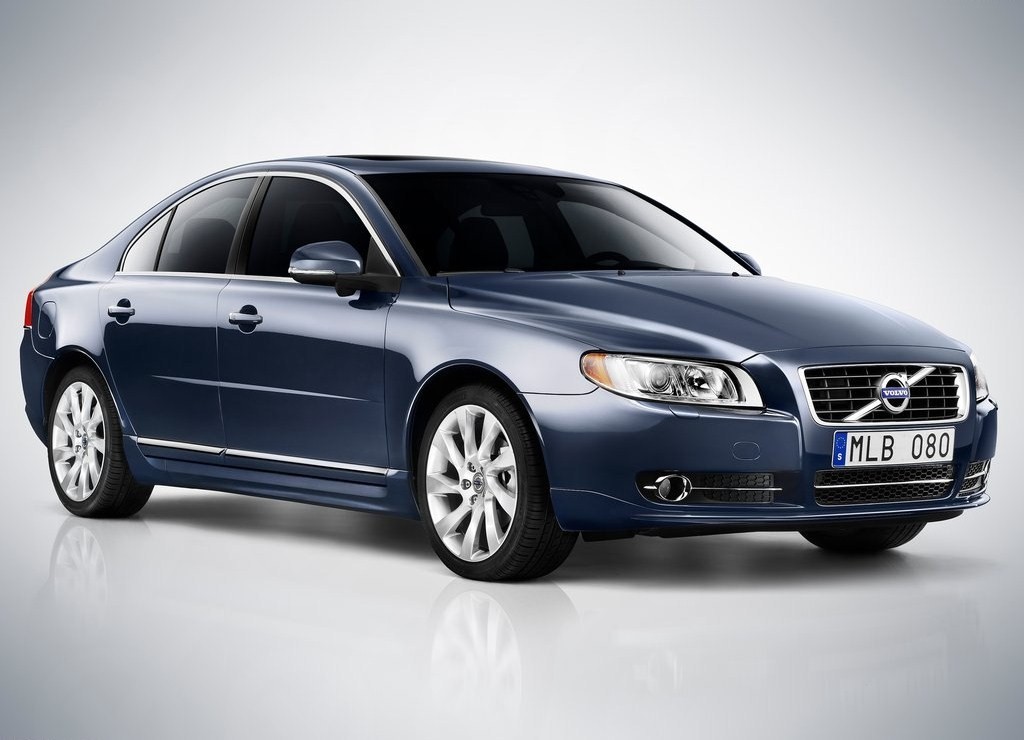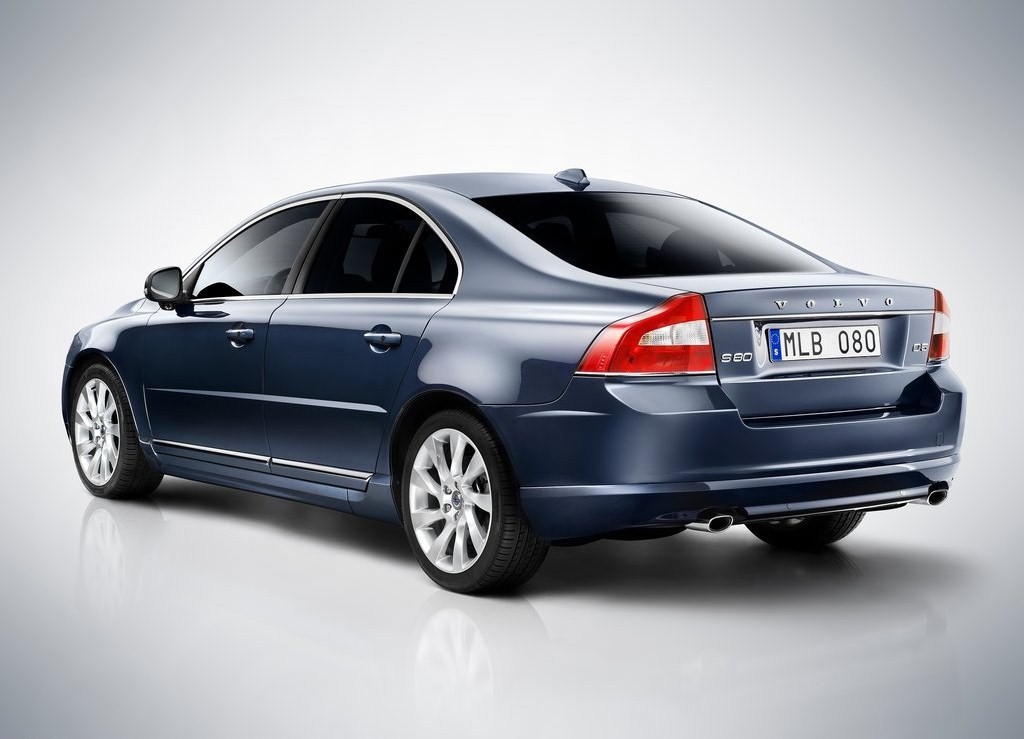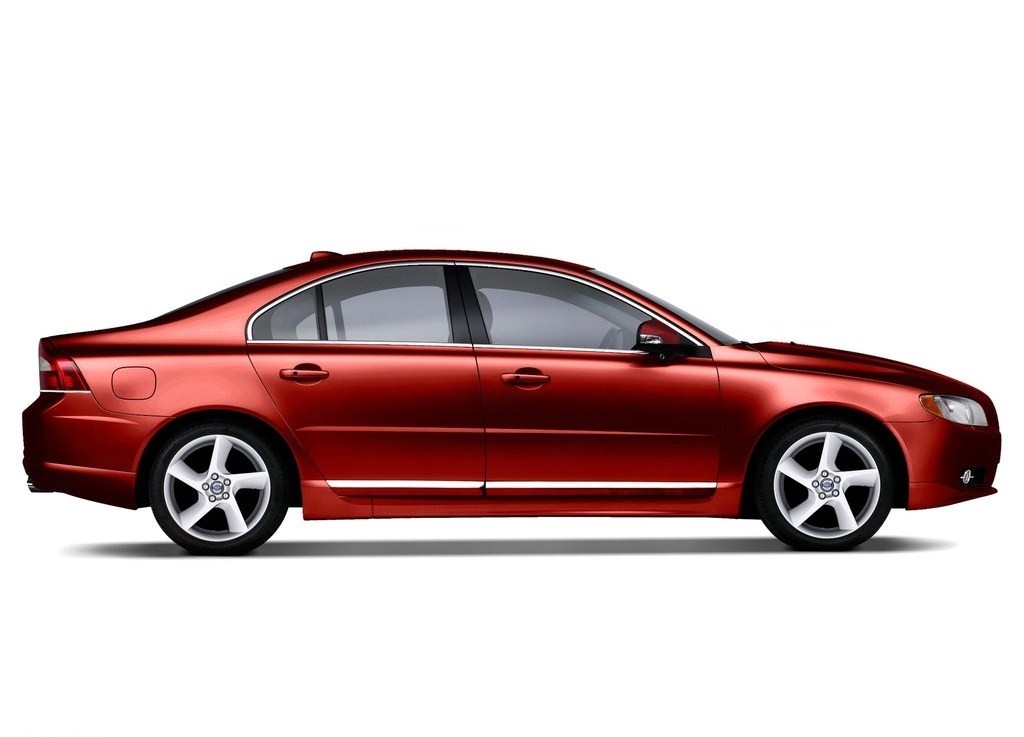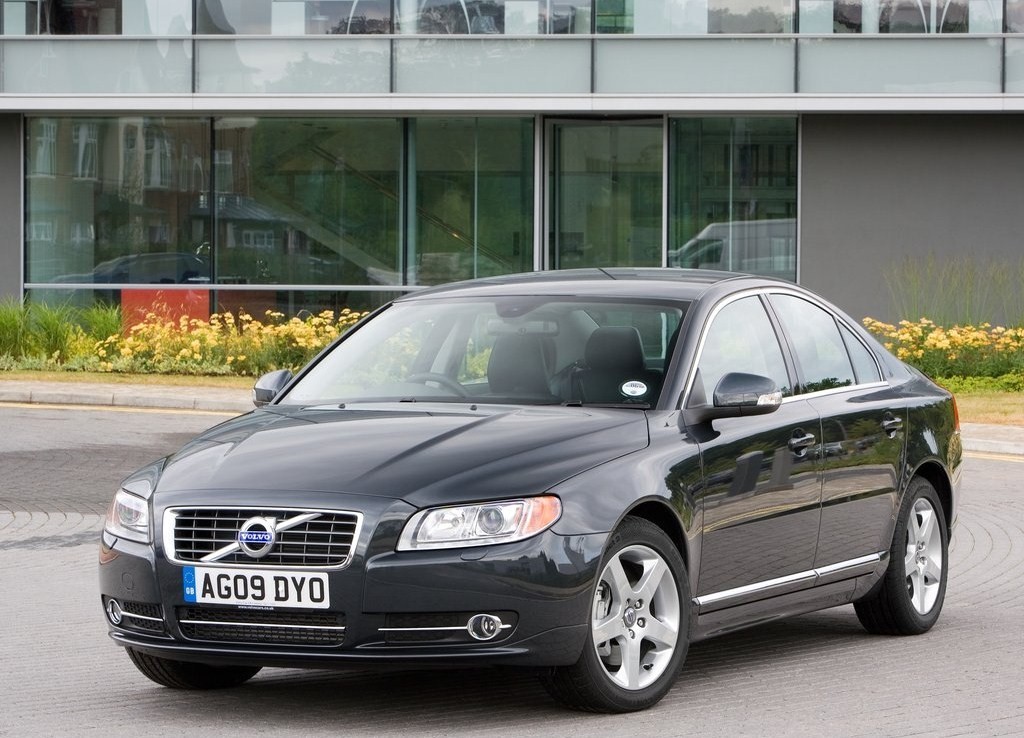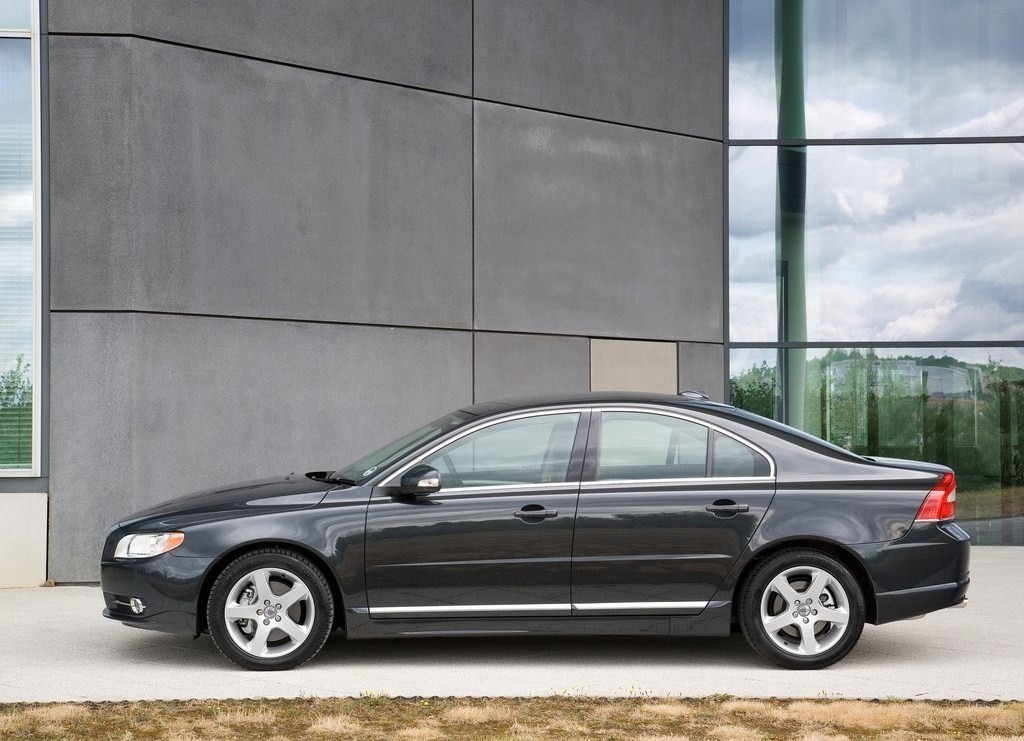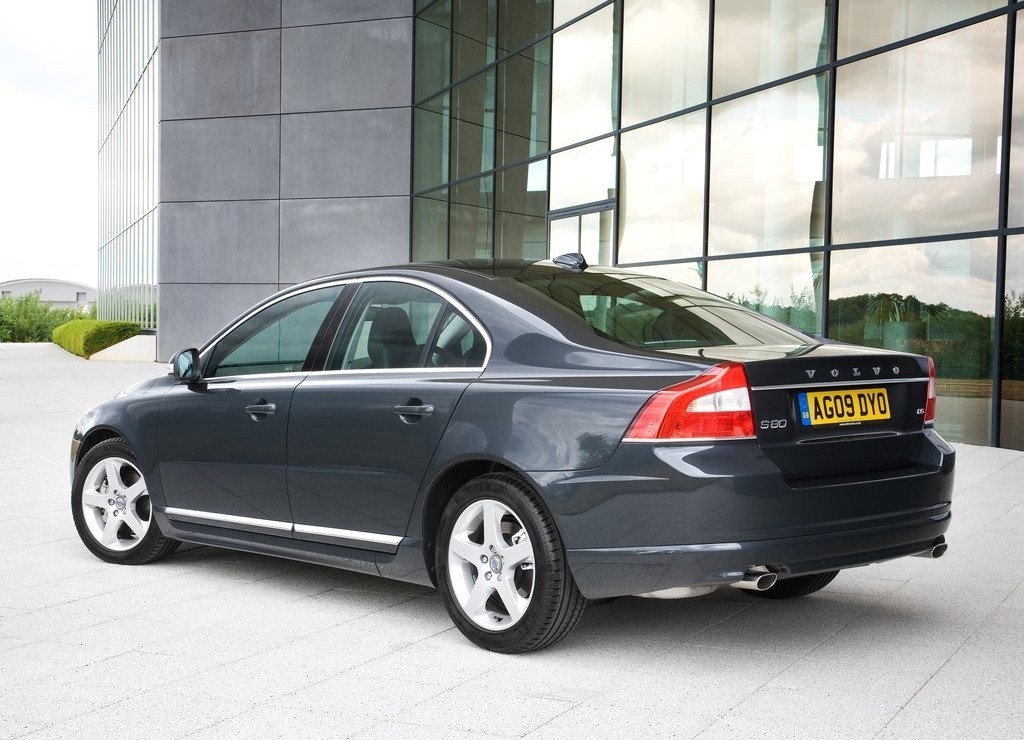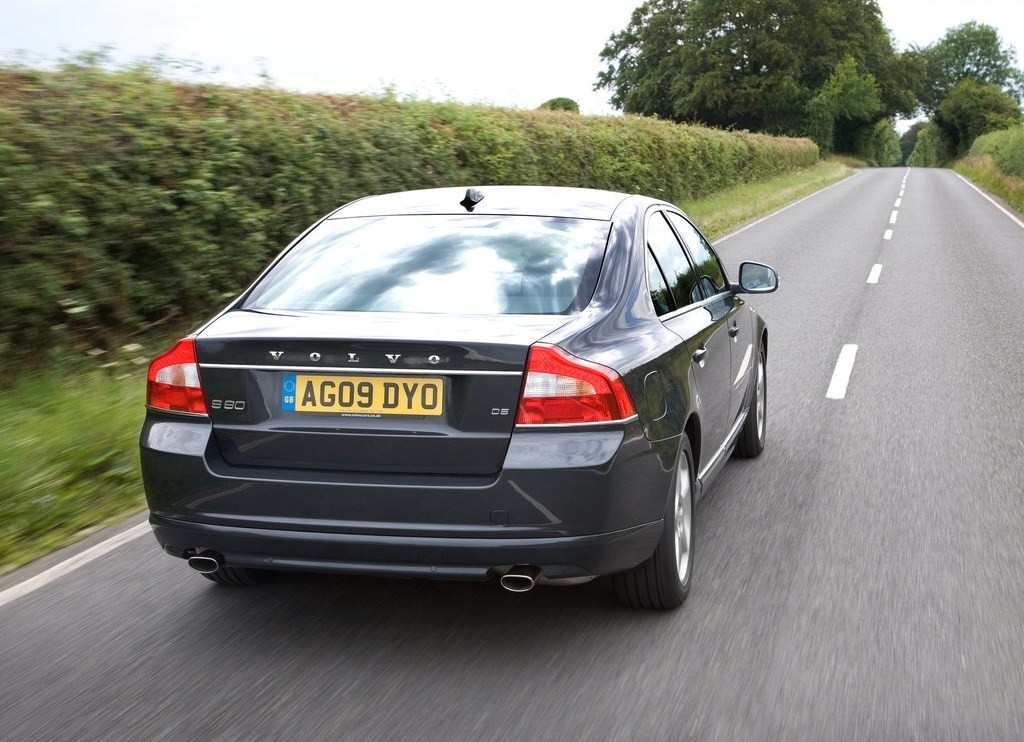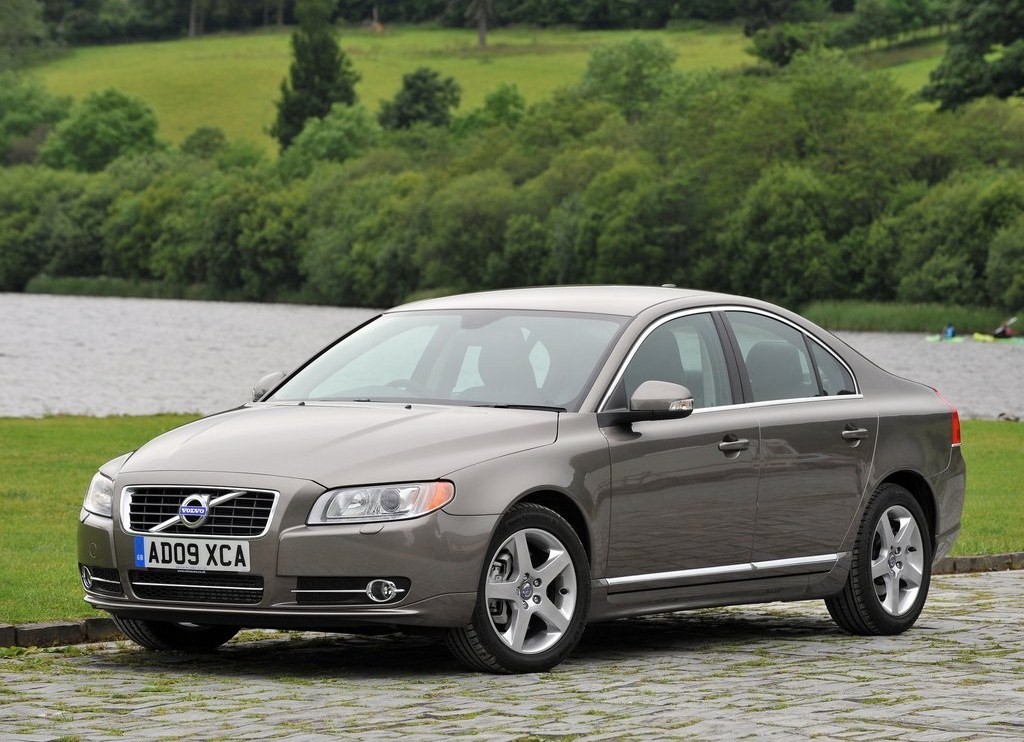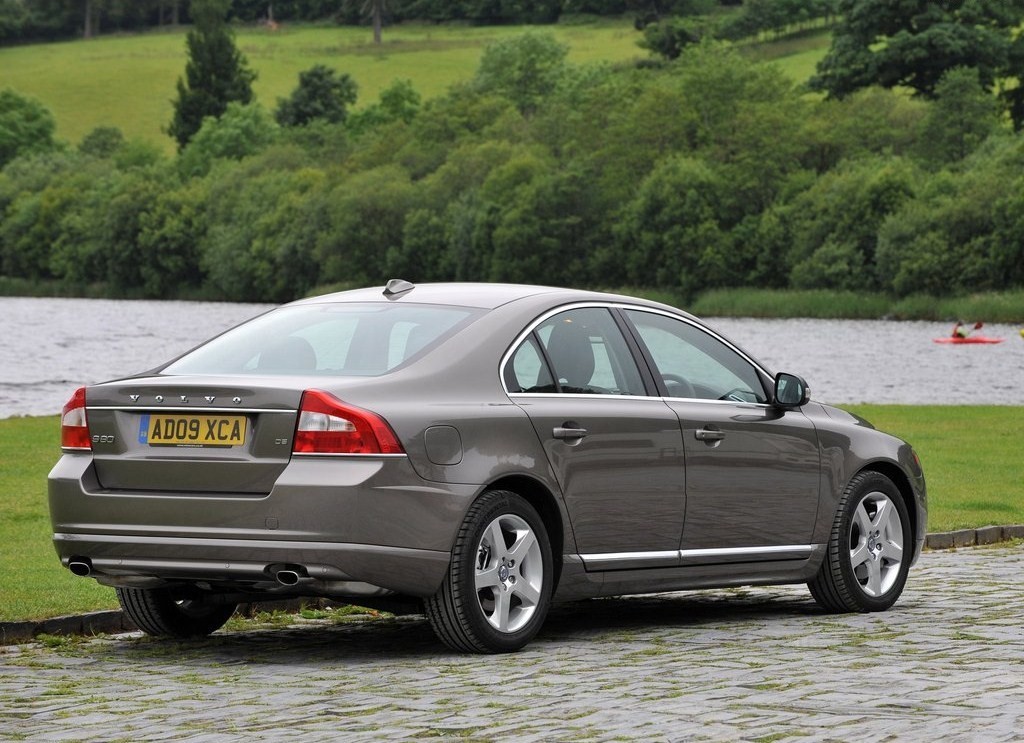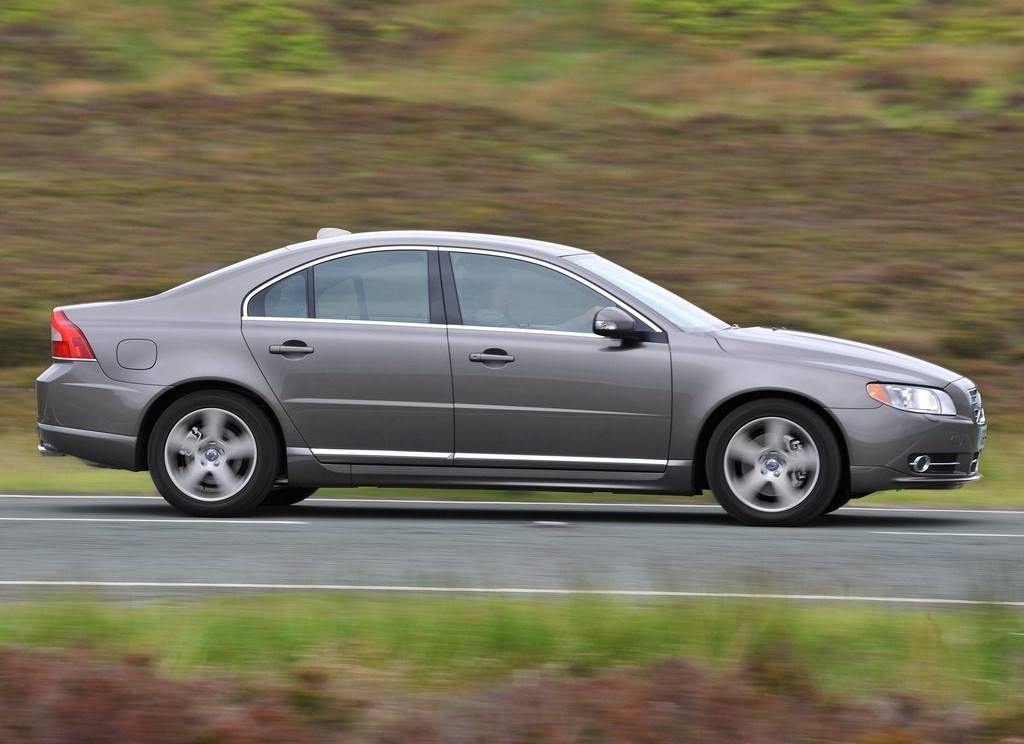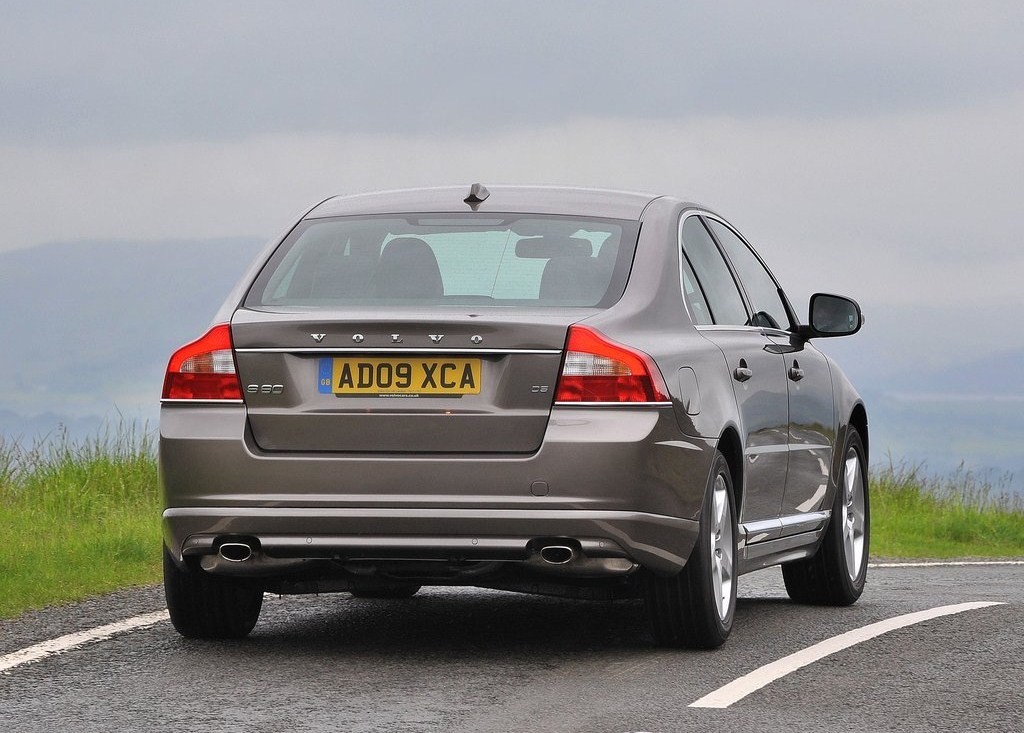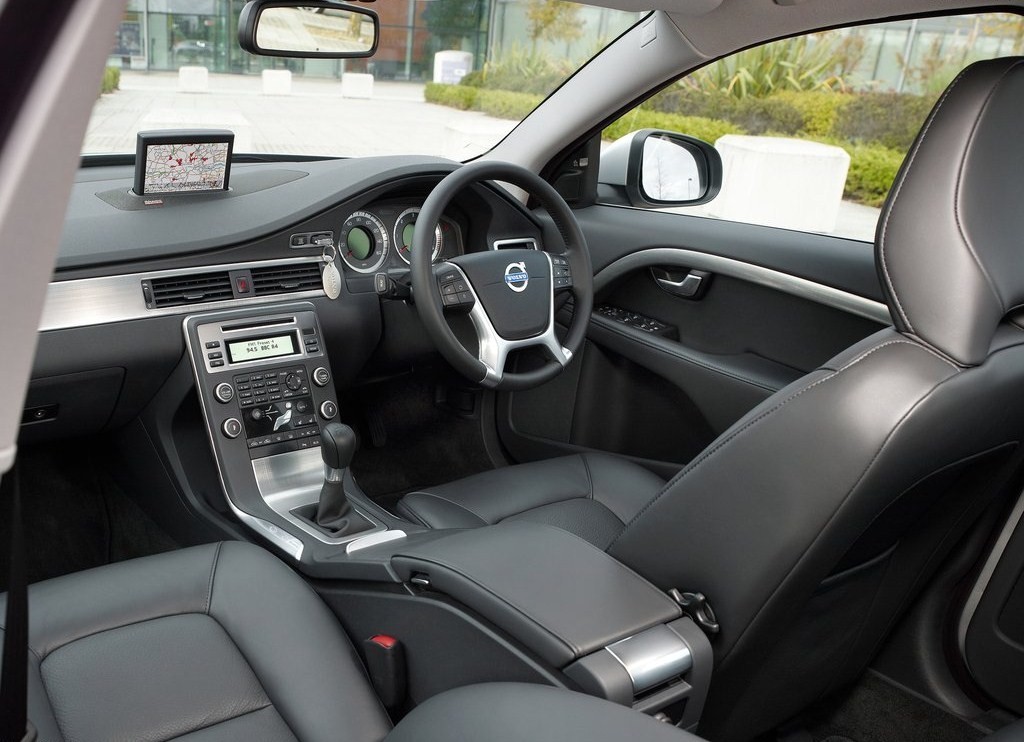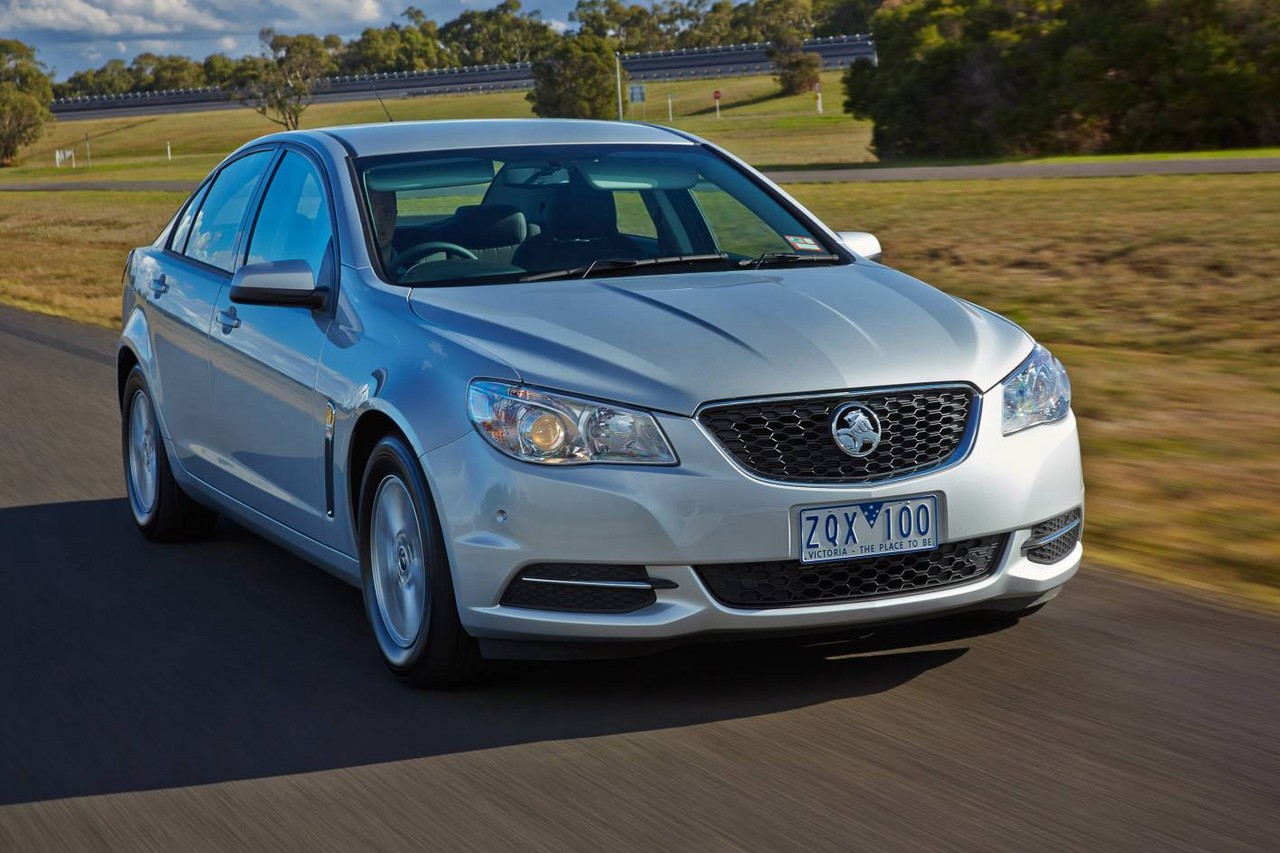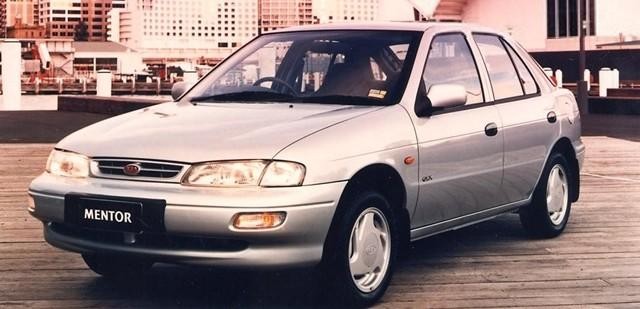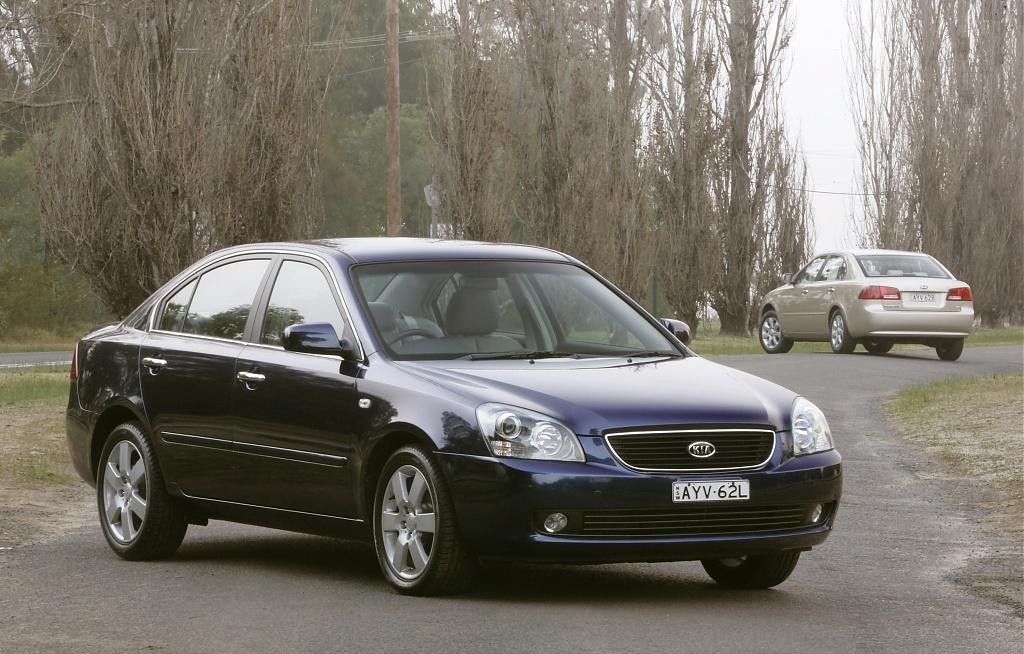
- Responsive 3.0-litre turbo six-cylinder engine
- Free-revving 4.4-litre V8 petrol engine
- Comfortable and spacious interior
- Progressive brake pedal response
- Generally comfortable ride…
- … but R-Design suspension with 18-inch wheels lacks compliance
- Steering lacks feel
- Front seats lack lateral support
- Large turning circle
- Oil consumption for 2007-11 Volvo S80 3.2 and T6
Review: Volvo Mk.2-I S80 (2007-09)
Overview
Released in February 2007, the Volvo Mk.2 Phase I (Mk.2-I) S80 was an executive sedan. Manufactured in Torslanda, Sweden, the Volvo S80 was initially available with a 3.2-litre six-cylinder petrol engine (the ‘3.2’ variant), a 4.4-litre petrol V8 (‘V8’) or a 2.4-litre five-cylinder turbo-diesel unit (‘D5’). In 2008, however, the 3.2-litre petrol engine was replaced by a turbocharged 3.0-litre unit (the ‘T6’).
Engines: 3.2, T6, D5 and V8
Of the engines,
- The 3.2-litre inline six cylinder engine had aluminium-alloy construction, double overhead camshafts, Variable Cam Timing (VCT) and Cam Profile Switching (CPS) for inlet valves, four valves per cylinder, a Variable Intake System (VIS) with two throttle flap valves and a compression ratio of 10.8:1;
- For T6 variants, the 3.0-litre inline six cylinder engine differed in that it was fitted with a twin-scroll turbocharger, Variable Cam Timing applied for both intake and exhaust valves and the compression ratio was lowered to 9.3:1;
- For D5 variants, the D5244T4 diesel engine had an aluminium cylinder block and heads, a water-cooled variable geometry turbocharger, common-rail direct injection (operating at 1600 bar), double overhead camshafts, four valves per cylinder, cooled exhaust gas recirculation and a compression ratio of 17.3:1; and,
- The 4.4-litre B8444S V8 petrol engine was developed by Yamaha and had aluminium construction, double overhead camshafts, variable inlet and exhaust valve timing, four valves per cylinder and a compression ratio of 10.4:1.
All engines were mated to six-speed automatic transmissions.
| Variant | Years | Engine | Trans. | Peak power | Peak torque |
|---|---|---|---|---|---|
| 3.2 AWD | 2007-08 | 3192 cc B6324S petrol I6 | 6sp auto | 175 kW at 6200 rpm | 320 Nm at 3200 rpm |
| T6 AWD | 2008-09 | 2953 cc B6304T2 turbo petrol I6 | 6sp auto | 210 kW at 5600 rpm | 400 Nm at 1500-4800 rpm |
| D5 | 2007-09 | 2400 cc B5244T4 turbo diesel I5 | 6sp auto | 136 kW at 4000 rpm | 400 Nm at 2750 rpm |
| V8 AWD | 2007-09 | 4414 cc B8444S petrol V8 | 6sp auto | 232 kW at 5950 rpm | 440 Nm at 3950 rpm |
AWD system
The Volvo S80 3.2, T6 and V8 had a Haldex all-wheel drive system with an electronically controlled multi-plate clutch. In normal conditions, the system provided a 95:5 front:rear torque split. However, the system’s ‘pre-tensioned’ clutch used a non-return valve within the coupling to immediately provide up to 80 Nm of torque to the rear wheels when sensors detected that it was required, i.e. before wheel slip actually occurred; the system would also provide torque to the rear wheels under acceleration. When the coupling’s clutch plates were engaged, up to 50 per cent of the engine’s torque could be directed to the rear wheels. The traction control system could also brake a single spinning wheel to transfer power to the wheels with traction, but was disabled under four-wheel braking.
Dimensions
Compared to the Volvo Mk.1 S80 , the Mk.2 S80 was 29 mm longer (at 4851 mm), 44 mm wider (1876 mm), 56 mm taller (1490 mm) and had a 44 mm longer wheelbase (2835 mm).
Suspension
The Volvo Mk.2 S80 had MacPherson strut front suspension and independent, multi-link rear suspension. The S80’s suspension also included Volvo’s ‘Four-C’ damping system – fitted as standard – which continuously varied suspension damping according to road conditions and driver behaviour; the system also provided selectable ‘Comfort’, ‘Sport’ and ‘Advanced’ modes.
Safety equipment
Standard safety equipment for the Volvo S80 included dual front airbags (two-stage), front side airbags, full-length curtain airbags (i.e. for front and rear occupants), ABS, electronic brake force distribution, brake assist, electronic stability control, traction control, seatbelt pretensioners for all seats, front seatbelt load limiters, active front seat head restraints and anti-submarining seats.
Features
Standard features for the Volvo S80 included 17-inch alloy wheels, an eight speaker 160 watt sound system with a six-in-dash disc CD player, MP3/WMA compatibility and auxiliary input, dual-zone climate control air conditioning, leather seats, power adjustable front seats with memory settings, heated front seats, bi-xenon headlights with washers, front and rear fog lights, front and rear parking sensors, rain-sensing wipers, 60/40 split and folding rear seats, remote central locking with proximity key, power windows and heated mirrors, power retracting mirrors, tinted windows, a rear blind, trip computer, an alarm and immobiliser.
The Volvo S80 3.2 and T6 added 18-inch alloy wheels, while the S80 V8 was distinguished by its twelve speaker, 650 watt sound system and Bluetooth connectivity.
November 2008: S80 update
In November 2008, the Volvo S80 underwent a minor update with Bluetooth connectivity made standard across the range. Other changes included revised trims, switchgear and improved audio systems.
Related links
- Press Kit: Volvo Mk.2-I S80 (February 2007)
- Volvo Newsroom: The all-new Volvo S80 challenges class leaders (January 2006)
- Volvo Newsroom: All-new Volvo S80 in Scandinavian luxury packaging (February 2006)
- Volvo Newsroom: Volvo S80: AWD and six cylinders (November 2006)
- Volvo Newsroom: Volvo S80 – model year 2008 (July 2007)
- Volvo Newsroom: Volvo S80 – model year 2009 (May 2008)
Review: Volvo Mk.2-II S80 (2009-10)
Overview
Released in November 2009, the Volvo Mk.2 Phase II (Mk.2-II) S80 introduced cosmetic updates, a better-equipped V8 variant and an upgraded D5 with a new 2.4-litre twin-turbo diesel engine and all-wheel drive system.
Visually, the Volvo Mk.2-II S80 could be identified by its new grille with a more prominent Volvo badge and chrome detailing for the lower front air intakes, lower door strips and under the tail-lights. Inside, there was a new four-spoke steering wheel with deco inlay, ergonomic window switches, new aluminium trim and ‘Dynamic’ seat upholstery with extra bolstering; the navigation system was also upgraded.
| Variant | Engine | Trans. | Peak power | Peak torque |
|---|---|---|---|---|
| T6 AWD | 2953 cc B6304T2 turbo petrol I6 | 6sp auto | 210 kW at 5600 rpm | 400 Nm at 1500-4800 rpm |
| D5 AWD | 2400 cc D5244T10 two-stage turbo diesel I5 | 6sp auto | 151 kW at 4000 rpm | 420 Nm at 1500-3250 rpm |
| V8 AWD | 4414 cc B8444S petrol V8 | 6sp auto | 232 kW at 5950 rpm | 440 Nm at 3950 rpm |
Safety equipment
Standard safety equipment for the Volvo S80 V8 included Volvo’s Lane Departure Warning with Driver Alert Control, Blind Spot Information System (BLIS) and Adaptive Cruise Control with Collision Warning and Auto Brake.
Features
Standard features were also revised: the S80 D5 was fitted with 18-inch alloy wheels, while the V8 gained satellite navigation.
S80 R-Design editions
The Volvo Mk.2-II S80 marked the introduction of the R-Design editions, which were distinguished by their unique 18-inch alloy wheels, lowered and sports-tuned suspension. Visually, the R-Design editions could be identified by their matt silver grille and door mirrors, body-coloured rear spoiler and chrome exhaust pipes.
Related links
- Technical Specifications: Volvo Mk.2-II S80 (September 2009)
- Volvo Newsroom: The refreshed S80 (February 2009)
- Volvo Newsroom: Volvo S80 – model year 2010 (February 2010)
Review: Volvo Mk.2-III S80 (2010-16)
Overview
Released in September 2010, the Volvo Mk.2 Phase III (Mk.2-III) S80 introduced an upgraded engine for the T6 and improved occupant protection; the range was also revised with the discontinuation of the D5 variant. Inside, there was a new steering wheel and gearshift knob, ‘watch dial’ instrumentation and stitching on the door and centre armrests.
The T6’s lower-friction engine was fitted with upgraded spark plugs and fuel efficiency was improved through the introduction of electric power steering, regenerative braking, a revised transmission program and modifications to the water pump and air conditioning compressor. The V8 was also fitted with electric steering and regenerative braking.
| Variant | Years | Engine | Trans. | Peak power | Peak torque |
|---|---|---|---|---|---|
| T6 AWD | 2010-16 | 2953 cc B6304T4 turbo petrol I6 | 6sp auto | 224 kW at 5600 rpm | 440 Nm at 2100-4200 rpm |
| V8 AWD | 2010-11 | 4414 cc B8444S petrol V8 | 6sp auto | 232 kW at 5950 rpm | 440 Nm at 3950 rpm |
Safety equipment
Compared to its Mk.2-II predecessor, side impact protection for the Volvo Mk.2-III S80 was improved by strengthening the body between the A- and B-pillars, while the curtain airbags were recalibrated for greater sensitivity during front and rear-quarter collisions. The rear head restraints were also revised and repositioned.
Furthermore, the emergency braking lights would automatically strobe in emergency braking situations, while the hazard lights would then be activated once the vehicle had decelerated to a speed of less than 10km/h.
Brochures
Related links
- Technical Specifications: Volvo Mk.2-III S80 (July 2010)
- Volvo Newsroom: Volvo S80 – model year 2011 (August 2010)
- Volvo Newsroom: Upgraded Volvo V70, XC70 and S80 (April 2011)
- Volvo Newsroom: Volvo S80 – model year 2012 (May 2011)
- Volvo Newsroom: Volvo S80 – model year 2013 (August 2012)
- Volvo Newsroom: The new Volvo S80, V70 and XC70 (September 2013)
- Volvo Australia: Volvo S80
- Wikipedia.org: Volvo Mk.2 S80
